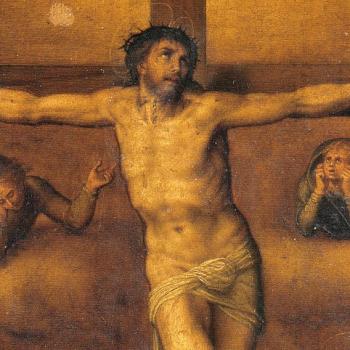
Angelika Kauffmann, “Christ and the Woman at the Well” (1796)
In Chapter 8 of Amoris Laetitia, Pope Francis speaks of the “law of gradualness”; John Paul II was the first to write of such a law, in Familiaris Consortio 34. Here is what John Paul II says:
It is always very important to have a right notion of the moral order, its values and its norms; and the importance is all the greater when the difficulties in the way of respecting them become more numerous and serious.
Very much so. That is the very situation in which we find ourselves, in an increasingly secular, even pagan, culture. We have lost the “right notion of the moral order”; and the obstacles to our knowing and following it have become “more numerous and serious.” Many of us have malformed consciences; many of us are walking around wounded. This is a fact; and it does us no good to refuse to face it. If anything, the situation is much more grave in 2016 than it was in 1981 when St. John Paul II wrote Familiaris. Here is more:
Since the moral order reveals and sets forth the plan of God the Creator, for this very reason it cannot be something that harms man, something impersonal. On the contrary, by responding to the deepest demands of the human being created by God, it places itself at the service of that person’s full humanity with the delicate and binding love whereby God Himself inspires, sustains and guides every creature towards its happiness.
[The moral law is not our enemy but our friend.]
But man, who has been called to live God’s wise and loving design in a responsible manner, is an historical being who day by day builds himself up through his many free decisions; and so he knows, loves and accomplishes moral good by stages of growth.
Consciences form through time; those whose consciences are malformed need time to repair them. That does not happen all at once. It was good for St. John Paul II to point this out; and it is why Pope Francis, in §305 of Amoris Laetitia, says that “[P]astor[s] cannot feel that it is enough simply to apply moral laws to those living in ‘irregular’ situations, as if they were stones to throw at people’s lives.” The mere iteration of a moral law as a cudgel against those who have not lived by it does no good; the Church must help sinners walk toward the true and the good; even when they are far away and getting there will take more than a few footsteps. And so Pope Francis says:
The way of the Church is not to condemn anyone for ever; it is to pour out the balm of God’s mercy on all those who ask for it with a sincere heart. For true charity is always unmerited, unconditional and gratuitous.” Consequently, there is a need “to avoid judgements which do not take into account the complexity of various situations” and “to be attentive, by necessity, to how people experience distress because of their condition.” (AL 296)
A pharisaical lot loves to ridicule “meeting people where they are”; but Pope Francis does not suggest that the Church leave people where they are. St. John Paul II gives an important qualification about the law of gradualness; one which Pope Francis reiterates. Here is John Paul II:
[W]hat is known as “the law of gradualness” or step-by-step advance cannot be identified with “gradualness of the law,” as if there were different degrees or forms of precept in God’s law for different individuals and situations. In God’s plan, all husbands and wives are called in marriage to holiness. (FC 36)
The law for one is the law for all, even if gradually approached. And so Pope Francis, himself quoting Familiaris Consortio 90, says:
This is not a “gradualness of law” but rather a gradualness in the prudential exercise of free acts on the part of subjects who are not [yet] in a position to understand, appreciate, or fully carry out the objective demands of the law. [Note that he says “objective demands,” not subjective options.] For the law is itself a gift of God which points out the way, a gift for everyone without exception; it can be followed with the help of grace, even though each human being “advances gradually with the progressive integration of the gifts of God and the demands of God’s definitive and absolute love in his or her entire personal and social life.” (AL 295)
I like the pope’s description of the moral law as a “gift” rather than a set of rules. I think that this is key to fully understanding Francis’s theology of joy. It is a gift for everyone, however far away from it; even if we have to go out to them and bring them back.
The pope does not say: I am giving you a gift by permitting you to ignore the moral law. By no means.
***
To illustrate his point about the Law of Gradualness, Pope Francis in §294 refers to Christ’s meeting with the Samaritan woman at the well. We find the story in chapter 4 of John’s gospel.
7 There cometh a woman of Samaria to draw water: Jesus saith unto her, Give me to drink.
8 (For his disciples were gone away unto the city to buy meat.)
9 Then saith the woman of Samaria unto him, How is it that thou, being a Jew, askest drink of me, which am a woman of Samaria? for the Jews have no dealings with the Samaritans.
10 Jesus answered and said unto her, If thou knewest the gift of God, and who it is that saith to thee, Give me to drink; thou wouldest have asked of him, and he would have given thee living water.
11 The woman saith unto him, Sir, thou hast nothing to draw with, and the well is deep: from whence then hast thou that living water?
12 Art thou greater than our father Jacob, which gave us the well, and drank thereof himself, and his children, and his cattle?
13 Jesus answered and said unto her, Whosoever drinketh of this water shall thirst again:
14 But whosoever drinketh of the water that I shall give him shall never thirst; but the water that I shall give him shall be in him a well of water springing up into everlasting life.
15 The woman saith unto him, Sir, give me this water, that I thirst not, neither come hither to draw.
16 Jesus saith unto her, Go, call thy husband, and come hither.
17 The woman answered and said, I have no husband. Jesus said unto her, Thou hast well said, I have no husband:
18 For thou hast had five husbands; and he whom thou now hast is not thy husband: in that saidst thou truly.
19 The woman saith unto him, Sir, I perceive that thou art a prophet.
20 Our fathers worshipped in this mountain; and ye say, that in Jerusalem is the place where men ought to worship.
21 Jesus saith unto her, Woman, believe me, the hour cometh, when ye shall neither in this mountain, nor yet at Jerusalem, worship the Father.
22 Ye worship ye know not what: we know what we worship: for salvation is of the Jews.
23 But the hour cometh, and now is, when the true worshippers shall worship the Father in spirit and in truth: for the Father seeketh such to worship him.
24 God is a Spirit: and they that worship him must worship him in spirit and in truth.
25 The woman saith unto him, I know that Messias cometh, which is called Christ: when he is come, he will tell us all things.
26 Jesus saith unto her, I that speak unto thee am he.
In “Jesus Christ the Bearer of the Water of Life” (here), the Pontifical Council for Culture says that John 4:7-26 is “a paradigm for our engagement with truth.” Christ, who knows full well about the Samaritan woman’s serial remarriages, does not throw a moral law at her like a stone but instead uncovers her true desire, her true longing, for the “spring of water welling up to eternal life.” As Pope Francis puts it:
[H]e addressed her desire for true love, in order to free her from the darkness in her life and to bring her to the full joy of the Gospel. (AL 294)
The Samaritan woman’s serial marriages were a continual search for true love where it was not to be found. Each of those five husbands were water that only made her thirst again. What she was really looking for was an encounter with Christ. And so, rather than telling her about a rule, Christ offered her a gift.
In this way, the Law of Gradualness is a process of acquainting wounded people, hurt by failed marriages, with where they will find true joy. It is a process of helping them reorient their lives toward God.
***
None of this means compromising on the moral law or the requirements of the Church. The pope, time and again, says otherwise.
The Church, says Pope Francis, “constantly holds up the call to perfection and asks for a fuller response to God” (AL 291).
“Christian marriage,” says Pope Francis, “as a reflection of the union between Christ and his Church, is fully realized in the union between a man and a woman who give themselves to each other in a free, faithful, and exclusive love.” They belong to each other until death and are open to the transmission of life.” No change in the law against contraception. They “are consecrated by the sacrament [of marriage], which grants them the grace to become a domestic church and a leaven of new life for society” (AL 292).
Priests, says Pope Francis, “are responsible for promoting Christian marriage” (AL 293).
“If someone,” says Pope Francis (in one of his strongest statements), “flaunts an objective sin as if it were part of the Christian ideal, or wants to impose something other than what the Church teaches, he or she can in no way presume to teach or preach to others; this is a case of something which separates from the community (cf. Mt 18:17). Such a person needs to listen once more to the Gospel message and its call to conversion.” The goal for those in irregular marriages, says Pope Francis, is “to reach the fulness of God’s plan” (AL 297).
Priests, says Pope Francis, have the responsibility of “helping [those in irregular unions] to understand their situation according to the teaching of the Church and the guidelines of the bishop.” “Useful in this process,” he says, “is an examination of conscience through moments of reflection and repentance” (AL 300). (Yes, the pope does call for repentance. Someone tried to tell me he does not.)
Priests, says Pope Francis, must “guide the faithful to an awareness of their situation before God. Conversation with the priest, in the internal forum, contributes to the formation of a correct judgment on what hinders the possibility of a fuller participation in the life of the Church and on what steps can foster it and make it grow.” “This discernment,” he says, “can never prescind from the Gospel demands of truth and charity.” Discernment, he says, requires “love for the Church and her teaching, in a sincere search for God’s will and a desire to make a more perfect response to it.” To that end, the pope disabuses readers of the thought that priests can just go around making exceptions to Church law. That, the pope says, would be a “grave misunderstanding” (AL 300).
Catholics and their pastors, says Pope Francis, must “discern and ensure full fidelity to God” (AL 304).
“In no way,” says Pope Francis, “must the Church desist from proposing the full ideal of marriage. … A lukewarm attitude, any kind of relativism, or an undue reticence in proposing that ideal, would be a lack of fidelity to the Gospel” (AL 307).
Time and again the pope says the opposite of what the bedwetters insist that he said. No one points this out; that is why I am here to do so.
But with pastoral charity, the pope does tell us that many, many people, in their marital and sexual lives, have fallen short of the moral law. That has happened for any number of complex reasons; pastors must discern carefully what those reasons are and what will best help bring wounded couples back into the life of the Church and a complete embrace of the moral law. The pope does not condemn sinners; neither does he condone sin. He is giving pastors guidelines on bringing sinners back home.
***
But what about those pesky parts like footnote 351? someone will ask. Is it the “smoking footnote” that Raymond Arroyo says it is? Does it allow communion for the divorced and remarried who have no annulment?
Well, I would start by saying that I have addressed this in an op-ed I wrote for Aleteia.
The second thing I would point out is that footnote 351 must be read in harmony with all the other places where the pope is firm about obedience to the teaching of the Church. One can not interpret it in such a way as to put it in conflict with what the pope says elsewhere. That is a false hermeneutic.
Fr. Dwight Longenecker is also of help here, in an excellent point he makes on his blog. (I had thought this very thing myself, but he beat me to saying it.)
Have we forgotten that there are seven sacraments? If we are welcoming those who are wounded and seeking the Lord then the sacraments are exactly what we give them in certain cases. In certain cases they will need baptism. In certain cases they will need confirmation. In certain cases they will need confession. In certain cases they will need anointing of the sick. In certain cases they will need marriage. Will they also need the Eucharist? Of course. They need to come to Mass. They need to come to Eucharistic Adoration. Do they need to receive communion? Of course—once their marriage situation has been regularized through the annulment procedure and proper Catholic marriage.
Fr. Dwight’s gloss of footnote 351 has the advantage, unlike the panicking ones, of being in harmony with what the pope says elsewhere. Just to imagine reading AL as a coherent text! What continuity is this, and what hermeneutics?
If I have any disappointment at all with Chapter 8, it is that the pope does not say a word about the importance of the annulments. These help to realign irregular marriages with Church teaching and God’s law. Perhaps the pope thought that local priests will naturally know to look into that first; and so he thought he did not need to mention it. But I still wish he had. An annulment can not only remove second marriages from their irregular status, but it also is a powerful aid in healing wounds.
In my own case, I pursued—and received—an annulment even though I did not technically need one. (I have not remarried.) And I found that the process not only healed me from the hurt of divorce, but it forced me to confront my own sins and failings and thus helped to reorder my life toward God. Since that is the pope’s real subject in Chapter 8, I wish he would have brought up the annulment process.
That was my only real quibble.












